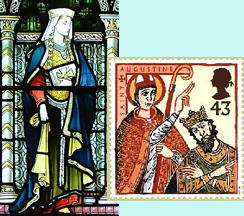Seleccionar idioma español/Choisissez la langue français

Bertha or Aldeberge (539 – c. 612) was the Queen of Kent whose influence led to the introduction of Christianity to Anglo-Saxon England.
Bertha was the daughter of Caribert, one of the four brothers who became Kings of the Franks in AD 561. Her mother was the pious Ingoberga. She married the pagan Aethelbert, King of Kent, who promised her the freedom to exercise her own Christian religion. She took as her chaplain to England, Liudhard, a bishop. Ethelbert gave him a little church at Canterbury, built as a Christian mausoleum during the Roman occupation of Britain and still standing. Liudhard restored the building and dedicated it in the name of St. Martin. It is the oldest church in England (excluding Welsh foundations in Cornwall, Herefordshire & Cumbria) and has been used continuously since that time. Bertha was happy with Aethelbert and the couple had at least three children, the future King Edbald and SS. Ethelburga & Edburga. Her character and conduct predisposed her husband in favour of Christianity and when, in AD 596, St. Gregory the Pope, sent a band of missionary monks to England, under Augustine, they were received with respect. The king and many others listened to their teaching. On Whitsunday AD 597, Aethelbert declared himself a Christian and was baptized; and his example was quickly followed by many of his people. He gave his own palace at Canterbury over to Augustine, who founded a church there, now the Cathedral. Aethelbert and Bertha, standing between Augustine and Liudhard, appear in the windows of the nave of Canterbury Cathedral, among the early English saints. Bertha died in AD 612 and, although spoken of in Canterbury as 'St. Bertha,' it is not clear that she has ever been worshipped and she has no dedications.
Edited from Agnes Dunbar's "A Dictionary of Saintly Women" (1904).
Æthelberht (also Æthelbert, Aethelberht, Aethelbert, or Ethelbert) (c. 560 – 24 February 616) was King of Kent from about 580 or 590 until his death. In his Ecclesiastical History of the English People, the monk Bede lists Aethelberht as the third king to hold imperium over other Anglo-Saxon kingdoms. In the late ninth century Anglo-Saxon Chronicle Æthelberht is referred to as a bretwalda, or "Britain-ruler". He was the first English king to convert to Christianity.
The native Britons had converted to Christianity under Roman rule. The Anglo-Saxon invasions separated the British church from European Christianity for centuries, so the church in Rome had no presence or authority in Britain, and in fact, Rome knew so little about the British church that it was unaware of any schism in customs. Æthelberht, however, would have known something about the Roman church from his Frankish wife, Bertha, who had brought a bishop, Liudhard, with her across the Channel. Æthelberht had a chapel built for her.
In 596, Pope Gregory the Great sent Augustine, prior of the monastery of St. Andrew in Rome, to England as a missionary, and in 597, a group of nearly forty monks, led by Augustine, landed on the Isle of Thanet in Kent. According to Bede, Æthelberht was sufficiently distrustful of the newcomers to insist on meeting them under the open sky, to prevent them from performing sorcery. The monks impressed Æthelberht, but he was not converted immediately. He agreed to allow the mission to settle in Canterbury and permitted them to preach.
It is not known when Æthelberht became a Christian. At the latest, Æthelberht must have converted before 601, since that year Gregory wrote to him as a Christian king.An old tradition records that Æthelberht converted on 1 June, in the summer of the year that Augustine arrived.
Through Æthelberht’s influence Sæberht, king of Essex, also was converted, but there were limits to the effectiveness of the mission. The entire Kentish court did not convert: Eadbald, Æthelberht’s son and heir, was a pagan at his accession. Rædwald, king of East Anglia, was only partly converted (apparently while at Æthelberht’s court), and retained a pagan shrine next to the new Christian altar. Augustine also was unsuccessful in gaining the allegiance of the British clergy.
Æthelberht’s code of laws for Kent, the earliest written code in any Germanic language, instituted a complex system of fines.
Æthelberht later was canonised for his role in establishing Christianity among the Anglo-Saxons.
from Wikipedia
God our ruler and guide, we honor you for Queen Bertha and King Ethelbert of
Kent who, gently persuaded by the truth of your Gospel, encouraged others
by their godly example to follow freely the path of discipleship; and we pray that
we, like them, may show the goodness of your Word not only by our words but in
our lives; through Jesus Christ, who with you and the Holy Spirit lives and reigns,
one God, in glory everlasting. Amen.